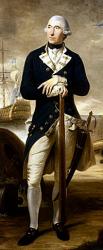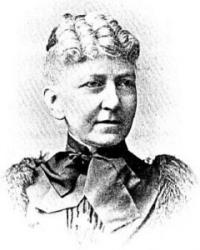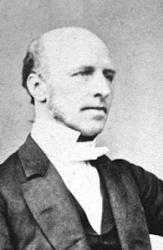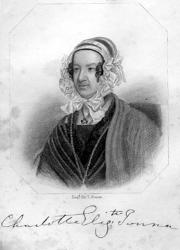Planning worship?
Check out our sister site, ZeteoSearch.org,
for 20+ additional resources related to your search.
- |
User Links
Person Results
‹ Return to hymnal






Export as CSV
I. Wrinkle
Hymnal Number: 1224 Author of "How bright that blessed hope" in Songs of Pilgrimage
I. Wrinkle
John Gambold

1711 - 1771 Hymnal Number: 453 Author of "No more with trembling heart I try" in Songs of Pilgrimage Gambold, John, M.A., was b. April 10, 1711, at Puncheston, Pembrokeshire, where his father was vicar. Educated at Christ Church, Oxford, where he graduated B.A. in 1730, M.A. in 1734. Taking Holy Orders, he became, about 1739, Vicar of Stanton Harcourt, Oxfordshire, but resigned his living in Oct. 1742, and joined the United Brethren [Moravians], by whom lie was chosen one of their bishops in 1754. He d. at Haverfordwest, Sept. 13, 1771. He published an edition of the Greek Testament; Maxims and Theological Ideas; Sermons, and a dramatic poem called Ignatius. About 26 translations and 18 original hymns in the Moravian Hymn Books are assigned to him. One or two of his hymns, which were published by the Wesleys, have been claimed for them, but the evidence is in favour of Gambold. A collected ed. of his works was published at Bath in 1789, and afterwards reprinted. [George Arthur Crawford, M.A.]
--John Julian, Dictionary of Hymnology (1907)
John Gambold
Henry Ustick Onderdonk

1789 - 1858 Hymnal Number: 559 Author of "The Spirit in our hearts is whispering sinner come" in Songs of Pilgrimage Henry Ustick Onderdonk, Bishop of Pennsylvania, was born in New York, March 16, 1789, and educated at Columbia College, B.A. 1805, M.A. 1808, D.D. 1827. Having decided to devote his life to medicine, he studied first in London and then in Edinburgh, receiving his M.D. from that university in 1810. Returning to New York, he began to study theology under Bishop Hobart and was ordained in 1815. He was rector of St. Ann's, Brooklyn, until 1827 when, following a famous controversy, he was elected bishop coadjutor of Pennsylvania, becoming diocesan in 1836 upon the death of Bishop White. He, with W.A. Muhlenberg, q.v., was influential on the committee appointed by General Convention to prepare the so-called Prayer Book Collection, 1826. The two men were also instrumental in the publication of the volume known as Plain Music for the Book of Common Prayer, in 1854. These books served until the Hymnal of 1874. Although some metrical psalms were included in the Prayer Book Collection, the book marked the change in America from psalmody to hymnody. Onderdonk contributed nine hymns, of which only one survives. He also wrote several works on the episcopacy. His weakness for alcohol necessitated his resignation in 1844, but his life from then on was so exemplary that he was restored to his bishopric two years before his death, which occurred in Philadelphia on December 6, 1858.
--The Hymnal 1940 Companion
================================================
Onderdonk, Henry Ustic, D.D., was born in New York, March 16, 1789, and educated at Columbia College. Taking Holy Orders, he was for some time Rector of St. Ann's Church, Brooklyn, New York. On the 27th Oct., 1827, he was consecrated at Philadelphia, and acted as Assistant Bishop of Philadelphia to Bishop White from that date to 1836, when upon the death of Bishop White, he entered upon the full charge of the diocese. He was suspended by the House of Bishops on the ground of intemperance in 1844, but restored in 1856. He died in Philadelphia, Dec. 6th, 1858. Without Bishop Doane's commanding talents, he yet rendered large and useful service to hymnody as author and compiler. He was a member (and apparently a leading one) of the Committee which compiled the American Prayer Book Collection of 1826 and was by far the largest contributor thereto. Apart from hymnwriting, so far as we know, he wrote nothing in verse.
His original hymns contributed to the Prayer Book Collection, 1826, are:—
1. Although the vine its fruit deny. Confidence in God. A paraphrase of Hab. iii. 17-19.
2. Blest be Thou, the God of Israel. Praise. A paraphrase of 1 Chron. xxix. 10-13.
3. How wondrous and great. Missions. A paraphrase of Rev. xv. 3, 4, being the Song of Moses and of the Lamb.
4. On Zion, and on Lebanon. Missions. Based on the text, Is. xxxv. 2.
5. Seek, my soul, the narrow gate. The Narrow Way. A paraphrase of St. Luke xiii. 24-27.
6. Sinner, rouse thee from thy sleep. Exhortation to awake out of sin. Based upon Eph. v. 14-17.
7. The Spirit in our hearts. Invitation. Based upon Rev. xxii. 17-20. This hymn may possibly have been suggested by Dr. Gibbons's "The Spirit in the word," which appeared in Hymns adapted to Divine Worship, 1769, p. 149. Bishop Onderdonk's hymn is in extensive use. Sometimes it is given as "The Spirit to our hearts."
8. Though I should seek to wash me clean. Need of the Mediator. This is not only used in full, but sts. iii.— v. are also used separately as "Ah, not like erring man is God."
9. When, Lord, to this our western land. Missions. This, and No. 4, were given in the Prayer Book Collection. "For Missions to the new Settlements in the United States."
In addition to these original hymns, Onderdonk contributed to the same collection the following adaptations from others:—
10. Ah, how shall fallen man? Redemption, This is I. Watts's "How should the sons of Adam's race?" (p. 539. i.), rewritten from the form given to it in the Scottish Translations and Paraphrases, 1781.
11. Heirs of unending life. Trust in God. Of this st. i. is by Onderdonk, and st. ii. and iii. are altered from Beddome's hymn "That we might walk with God." Sometimes given as "Heirs of immortal life."
12. The gentle Saviour calls. Christ accepting Children. This is altered from Doddridge's "See Israel's gentle Shepherd stand." It is sometimes given as "The Saviour kindly calls." [Rev. F. M. Bird, M.A.]
--John Julian, Dictionary of Hymnology (1907)
Henry Ustick Onderdonk
Richard Kempenfelt

1718 - 1782 Hymnal Number: 1171 Author of "Hark, 'tis the trump of God" in Songs of Pilgrimage Kempenfelt, Richard, of Swedish descent, was born Oct., 1718. In Jan., 1741, he obtained a lieutenant's commission in the British Navy. He became captain in 1757, and admiral in 1780. He was drowned in the "Royal George," which sank in harbour at Portsmouth on Aug. 29, 1782. Admiral Kempenfelt was an admirer of Whitefield and the Wesleys, and interested himself much in evangelistic work. His hymns were published as Original Hymns and Poems. By Philotheorus. Exeter, printed by B. Thorn, 1777, and were dedicated "To the Rev. Mr. Fletcher, Vicar of Madeley, in Shropshire." They were reprinted, with a Preface, by D. Sedgwick, in 1861. Although most of these hymns are given in the older collections, only a few re¬main in modern hymn-books, and, including centos, are:—
1. Bear me on Thy rapid wing. Praise to Jesus in Heaven.
2. Burst, ye emerald gates, and bring. Praise to Jesus in Heaven.
3. Gentle Spirit, waft me over. Heaven desired.
4. Hail, Thou eternal Logos, hail. Adoration of Jesus.
5. Hark, 'tis the trump of God. The Last Day.
6. O my Redeemer, come. The Last Day.
Of these Nos. 1 and 2 are from the same hymn; and Nos. 5 and 6 also from another. The original texts of Nos. 3, 5, and 6 are in Lyra Britannica 1867, pp. 349-52.
--John Julian, Dictionary of Hymnology (1907)
Richard Kempenfelt
Harriet M. Kimball

1834 - 1917 Hymnal Number: 686 Author of "To him who hears, I whisper all" in Songs of Pilgrimage Kimball, Harriet McEwan, a native and resident of Portsmouth, Newhaven, is the author of Hymns, Boston, 1866; Swallow Flights of Song, 1874, &c. Her hymns include:—
1. At times on Tabor's height. Faith and Joy
2. Dear Lord, to Thee alone. Lent.
3. It is an easy thing to say. Humble Service.
4. We have no tears Thou wilt not dry. Affliction. Appeared in the Poets of Portsmouth, 1864, and the Unitarian Hymns of the Spirit, 1864, and others. In Miss Kimball's Hymns, 1866, this hymn begins with stanza iii. of "Jesus the Ladder of my faith."
Several of Miss Kimball's poems were included in Baynes's Illustrated Book of Sacred Poems, 1867. [Rev. F. M. Bird, M.A.]
--John Julian, Dictionary of Hymnology (1907)
===================
Kimball, Harriet M., p. 624, ii., b. Nov. 2, 1834, and a Roman Catholic. From her hymn, "Jesus, the Ladder of my faith," p. 624, iii. 3, another cento, beginning "Sweeter to Jesus when on earth/* is taken. It is in The Pilgrim Hymnal, 1904.
--John Julian, Dictionary of Hymnology, New Supplement (1907)
Harriet M. Kimball
T. R. Birks

1810 - 1883 Person Name: Thomas R. Birks Hymnal Number: 1091 Author of "Whom have I, Lord, in heaven but thee" in Songs of Pilgrimage Birks, Thomas Rawson, M.A., b. Sept. 1810, and educated at Trinity College, Cambridge (B.A. 1834, M.A. 1837), of which he subsequently became a Fellow. Having taken Holy Orders in 1837, he became Rector of Kelshall, Herts, 1844; Vicar of Holy Trinity, Cambridge, 1866; Hon. Canon of Ely Cathedral, 1871; and Professor of Moral Philosophy, Cambridge, 1872. He d. at Cambridge, July 21, 1883. His works, to the number of 25, include Biblical, Astronomical, Scientific, Prophetic, and other subjects. He also wrote the Memoirs of the Rev. E Bickersteth (his father-in-law), 2 vols., 1851. His hymns appeared in Bickersteth's Christian Psalmody; 1833; and, together with Versions of the Psalms, in his Companion Psalter, 1874. They number upwards of 100. [Eng. Psalters, § xx.] Very few are in common use in Great Britain, but in America their use is extending. They include:—
1. Except the Lord do build the house. Ps. cxxvii.
2. O come, let us sing to the Lord. Ps. xcv.
3. O King of Mercy, from Thy throne on high. Ps. lxxx.
4. O taste and see that He is good. Ps. xxxiv.
5. O when from all the ends of earth. Psj xiv.
6. The heavens declare Thy glory. Ps. xix.
7. The Lord Himself my Portion is. Ps. liii.
8. The mighty God, the Lord hath spoken. Ps. l.
9. Thou art gone up on high, O Christ, &c. Ps. xlvii.
10. Whom have I [we] Lord in heaven, but Thee. Ps. lxxiii.
Of these versions of the Psalms, all of which date from 1874, the most popular is No. 3. Mr. Birks' compositions are worthy of greater attention than they have hitherto received.
--John Julian, Dictionary of Hymnology (1907)
T. R. Birks
Henvy Virtue Tebbs
1797 - 1876 Person Name: H. V. Tebbs Hymnal Number: 115 Author of "Come to me, Lord, when first I wake" in Songs of Pilgrimage Tebbs, Henry Virtue, was born in Chelsea in 1797. He was a Proctor in Doctors' Commons, and joined in establishing the first Sunday School in Chelsea. Most of his later years were spent on the Continent, mostly at Pegli, near Genoa, and where, mainly through his exertions, a Church for the English congregation was erected and where he died Nov. 27, 1876. (Record, Dec. 23,1876.) His hymn "Come to me, Lord, when first I wake" (Morning) was written for his wife's birthday, March 16, 1851, and circulated in MS. for some years. In 1866 it was printed in the N. Y. Hours at Home, and then in the Hymnal Companion and other collections. It has been translated into 17 languages, and has also been embossed for the blind.
--John Julian, Dictionary of Hymnology, Appendix, Part II (1907)
Henvy Virtue Tebbs
James Edward Smith
1759 - 1828 Hymnal Number: 249 Author of "Praise waits in Zion, Lord, for thee Thy saints adore thy holy name" in Songs of Pilgrimage Smith, Sir James Edward, born at Norwich Dec. 2, 1759; died March 17, 1828. A distinguished botanist, and President of the Linnaean Society from its foundation in 1788 to the time of his death. He was knighted when the Prince Regent became, in 1814, a Patron of the Society. Smith studied medicine at Edinburgh, and, in 1786, graduated as a physician at Leyden. After further travels abroad he finally settled down at Norwich in 1797. He published English Botany in 36 vols. (beginning in 1790) and various other botanical works. He was also a large contributor to Rees's Encyclopaedia. The friend of Dr. Enfield and John Taylor, he was also a member of the congregation meeting in the Octagon Chapel, Norwich, and a subscriber to the British and Foreign Unitarian Association. He contributed 3 hymns to A Selection of Hymns for Public Worship, Norwich, 1814 (printed for the Octagon Chapel); and 6 others to the Supplement added to the 2nd edition, 1826. Of these the following are in Dr. Martineau's Hymns, &c, 1840; his Hymns, &c, 1873, and other Unitarian collections:—
1. Adore, my soul, that awful Name (1814). Dependence upon God.
2. As twilight's gradual veil is spread (1814). Nature and Immortality.
3. Holy, wise, eternal Father (1826). The Mansions of the Blessed.
4. How glorious are those orbs of light (1826). Nature and Immortality.
5. Praise waits in Zion, Lord, for Thee (1826). Public Worship.
6. When power divine in mortal form (1826). Confidence in God.
7. Who shall a temple build for Him (1826). God's Temple in the Heart. [Rev. Valentine D. Davis, B.A.]
--John Julian, Dictionary of Hymnology (1907)
James Edward Smith
Thomas Greene
1710 - 1779 Person Name: T. Green Hymnal Number: 998 Author of "My days, my [and] weeks, my [and] months, my [and] years" in Songs of Pilgrimage Greene, Thomas, of Ware, was for some time a member of the Congregational body in that town. In 1778 a minority of the members, of Arian principles, having obtained the lease of the chapel, the majority seceded and built themselves the "Old Independent Chapel." Mr. Greene was one of these seceders (Miller's Singers & Songs, 1869, p. 314). His Hymns and Poems on Various Subjects, chiefly Sacred, were published in 1780 (2nd ed., 1797). From this work the hymn "It is the Lord, enthroned in light" (Resignation), is taken. In Bickersteth's Christian Psalmody, 1833, it begins, "It is the Lord, my covenant God." In modern collections it is found in both forms. Another hymn from the same work is "The more my conduct I survey " (Trusting in Jesus), as in Spurgeon's 0ur Own Hymn Book, 1866.
--John Julian, Dictionary of Hymnology, Appendix, Part II (1907)
Thomas Greene
Charlotte Elizabeth

1790 - 1846 Person Name: Charlotte Elizabeth Tonna Hymnal Number: 695 Author of "O for a prayer like his of old" in Songs of Pilgrimage Charlotte Elizabeth was born at Norwich in 1790. Her father, the Rev. Michael Browne, was Rector of S. Giles' parish in that city. She married Captain George Phelan, of the army, but the union proved an unhappy one. Thrown upon her own resources, she contributed to the Dublin Tract Society, and in 1834, became editor of "The Christian Ladies' Magazine." Her husband died in 1837. In 1840, she married Mr. L.H. Tonna, but continued to retain her two Christian names as her literary designation. She died in 1846. Her works are very numerous.
--Annotations of the Hymnal, Charles Hutchins, M.A. 1872.
===========================
Other names: Charlotte Elzabeth Browne Tonna, Mrs. Tonna, Author of Zadoo, Charlotte Elizabeth Phelan
===========================
Tonna, Charlotte Elizabeth, née Browne, commonly known as "Charlotte Elizabeth," was the only daughter of Michael Browne, Rector of St. Giles, Norwich, and was born in Norwich, Oct. 1, 1790. She was first married to Captain George Phelan, of the 60th Rifles (who died in 1837), and secondly to the Rev. Lewis H. Tonna. Her death took place at Ramsgate, July 12, 1846. Under the name of "Charlotte Elizabeth" she published several works, including Chapters on Flowers, Derry, a Tale of the Revolution, Personal Recollections, &c. Her hymns in common use include:—
1. Holy Father, heavenly King (1832). God Man's only Refuge.
2. O God of Israel, deign to smile. For Resignation.
3. O Thou Who didst prepare. For Use at Sea.
4. Sinner, what hast thou to show? Christians' Joy.
5. Soldier go, but not to claim. The Good Fight of Faith.
Of these hymns Nos. 3, 4 appeared in W. Urwick's Dublin Collection of Hymns, 1829.
-- John Julian, Dictionary of Hymnology (1907)
Charlotte Elizabeth


 My Starred Hymns
My Starred Hymns


